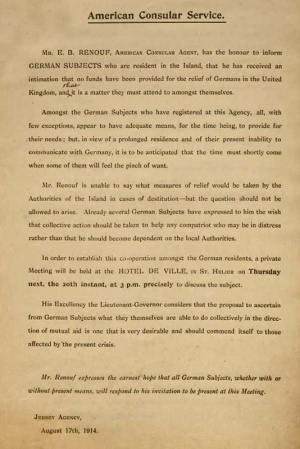From the outbreak of the war until it ended, Jersey was to have problems with resident aliens – the term which has always been applied to those not born in the island or the United Kingdom.
Reservists leave
Jersey had a long tradition of welcoming immigrants from France, firstly as refugees and more recently as agricultural workers. The numbers who had settled in the island can be judged by the exodus of several thousand reservists who went to join their regiments when France mobilised days before war broke out.
Many left their families behind and others of non-military age would still be available to cross from the French coast to work for Jersey farmers throughout the spring and summer. There had been no restrictions on this movement and no registration of foreigners resident in Jersey – that would not come until after the War.
The Lieut-Governor recognised the need to control the movement of aliens and took powers to do so from the earliest days of the war.
Although the likelihood of enemy spies attempting to reach Jersey – if they were not already there – was not great, there were genuine fears that it might be, and foreign nationals were identified as potential German agents. One farmer denounced one of his workers as a spy although he had worked for him for 30 years.
Those causing the greatest concern were the dozens of German and Austro-Hungarian nationals who had been living in the island. Their movement and behavious was strictly controlled by the new Aliens Restriction Act.
As a group, with the support of Jersey's American Consular Agent, who agreed to look after their interests, they commited to full co-operation with the authorities and to supporting each other's interests. They were to be monitored by the newly appointed Aliens Officer, Centenier Arthur Luxon. The Lieut-Governor required him to register all foreign nationals and keep track of their movements. His concern did not stretch to paying for the position. The UK Government denied responsibility and the States were left to pay his wages and costs.
There were numerous incidents involving aliens, both German nationals and others, as the war progressed. In December 1914 two German citizens were arrested in St Brelade's Bay following allegations of night-time signalling to vessels lying offshore.
Cigar order intercepted
And in April 1915 another form of communicating with the enemy led to the prosecution of Charles Amy, who responded to an advertisement in Tobacco magazine by writing to a wholesaler in Copenhagen in an attempt to import luxury German cigars.
His letter was intercepted and the Lieut-Governor insisted that he was prosecuted under the Trading with the Enemy Act. The Royal Court was less than impressed and discharged the accused with a warning. The supposed threat posed by the presence of 'enemy aliens' in Jersey was brought into perspective when numbers were released in June 15. There were only 43 men who were citizens of Germany or its allies and 13 women. Some of the men were members of Catholic orders with institutions in the island and were considered a very low risk.
An assurance was issued that all enemy aliens were under constant surveillance and any suspicious behaviour would be investigated.
Just such an investigation took place later in the month when the official censor suspected a letter which he intercepted contained some form of code or a message in invisible ink. The States Analyst was asked to examine the letter, but found nothing suspicious.
It seems that any opportunity to deport an unwanted alien was taken. In February 1916 two German nationals, including a hotel waiter, were sent under escort to an internment camp in London. Those remaining were stopped from working in hotels. The fear was that they might otherise overhear sensitive business or military conversations. All enemy aliens were required to be home and stay there by 7 pm. When Jacob Krudewig complained to the Lieut-Governor about being forced to give up his job as a waiter at St Brelade's Bay Hotel, not only did his appeal fail, but it was decided to send him to be interned in England because he had no other means of earning a living.
This meant that his Jersey-born wife Alice, who remained behind with three Jersey-born daughters, had no income. After initially refusing to help her, the Jersey authorities relented and agreed to provide support.

